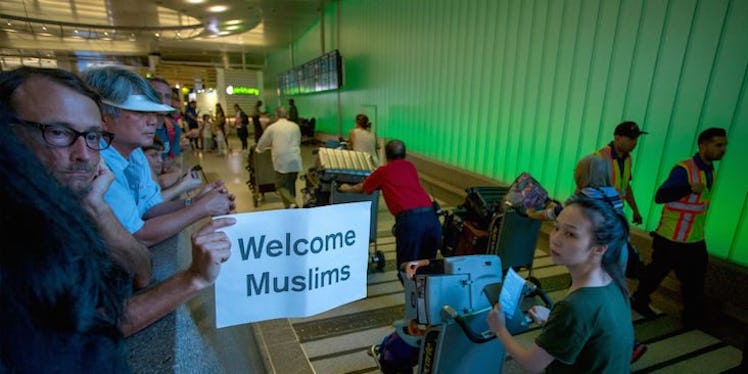
Trump's Travel Ban Is Being Replaced With A New Plan With Even More Restrictions
On Friday morning, Sept. 22, the Wall Street Journal reported that new restrictions will replace President Donald Trump's travel ban, taking effect as soon as this weekend when the current 90-day travel ban expires. The restrictions will reportedly vary by country, and it's not clear yet which countries will be affected or how. Under the new plan, the total number of restricted countries may rise to nine.
According to WSJ, a list of 17 nations were flagged by the Department of Homeland Security as problematic for failure to comply with standards. In order to avoid being subject to the travel ban, about half of those countries reportedly implemented measures to comply. The first version of the travel ban placed restrictions on seven Muslim-majority countries: Iran, Iraq, Somalia, Libya, Syria, Yemen, and Sudan; Iraq was later removed from the list. The DHS reportedly recommended travel restrictions such as additional background checks -- but not bans -- on the remaining countries. This would put the total number of countries with restrictions at nine.
It's unclear which countries will be added and what these specific, country-based restrictions will look like. One former DHS source told Politico that additional restrictions could take the form of increased background checks, interviews or social media screenings. The WSJ quotes a source familiar with the DHS plan describing the approach as, "tailored sanctions commensurate with their deficiencies," that focus on the threat of each country and diplomatic dynamics that restrictions might affect. The New York Times reports that the new ban will not change the limit on refugees allowed into the country. The president will have the final call and may choose to reject or revise the DHS recommendations.
An unnamed White House spokesperson was quoted in the WSJ saying,
The Trump administration will ensure we only admit those who can be properly vetted and will not pose a threat to national security or public safety.
On Twitter, some have sought to provide their interpretation of the updated ban. An immigration lawyer posted some explanations to help clarify what the expiration of the current ban means:
The travel ban, or "Muslim ban," as it known to some, was introduced by Trump as an executive order on Jan. 27, less than a week after he took office. Since then, the road has been bumpy; the first, seven-country order was halted by courts, as did a revised version Trump released in March. Finally, in June, a modified version of the ban was temporarily allowed by the Supreme Court while they weighed the case, permitting entry for those with "bona fide" relationships. The expiration date for that 90-day allowance is this Sunday.
Each iteration of the ban -- and their subsequent blockages in the judicial system -- have been met with both praise and protest around the country and the world.
Earlier this month, following the explosion on the London underground, Trump hinted at the new travel ban restrictions in a tweet.
Already, a spectrum of reactions are appearing on Twitter in response to the news of the updated restrictions. Below, a law professor and human rights lawyer shared his thoughts:
The Supreme Court is set to hear the opening arguments of the March version of the order on Oct. 10, and the latest changes could seriously impact how that case goes. The New York Times reports that the Court will likely solicit information from lawyers on both the governmental and challenging side prior to that date. The case, which focuses on the constitutionality of the ban, may face a fresh challenge in proving unfair discrimination based on religion given that its new restrictions are tailored by country. The fate of refugee allowances is also on the line.